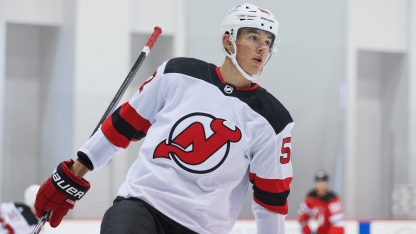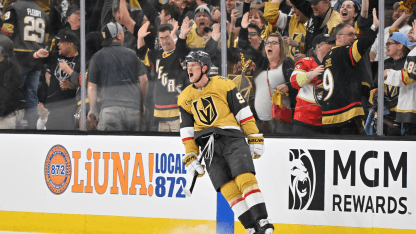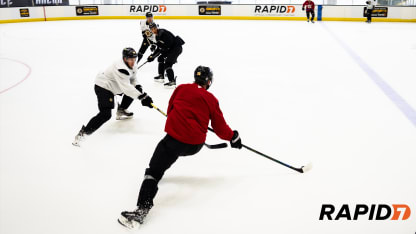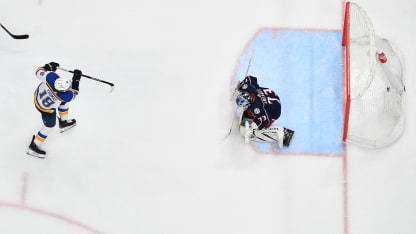Color of Hockey: Guerra's sled hockey discovery led to U.S. Hockey Hall of Fame
Color of Hockey: Guerra's sled hockey discovery led to U.S. Hockey Hall of Fame
Goalie helped build program's foundation of success with gold medal at 2002 Paralympic Games
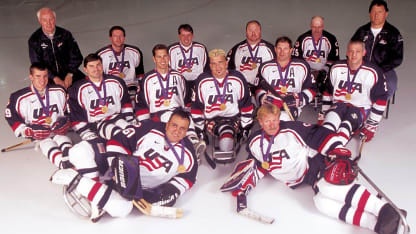
© USA Hockey
William Douglas has been writing The Color of Hockey blog since 2012. Douglas joined NHL.com in 2019 and writes about people of color in the sport. Today, as part of NHL.com’s celebration of Hispanic Heritage Month, he profiles Manny Guerra, goalie for the 2002 United States Paralympic Sled Hockey Team that was elected to the U.S. Hockey Hall of Fame’s Class of 2024.
Manny Guerra discovered sled hockey by chance.
Guerra was headed to the gym at the Sister Kenny Rehabilitation Institute in Minneapolis in 1991 when a VHS tape of a sled hockey game playing in an office caught his attention.
“I was just amazed and was, like, ‘Oh my God, I want to try that,'” he said. “It brought me back to when I played boot hockey growing up in Chicago on those cold days, wearing what I could afford at the time, which was a baseball glove, a makeshift waffle, and leg pads made out of couch stuffing.”
Guerra’s wide-eyed fascination was the starting point of a playing career highlighted by being the goalie for the U.S. sled hockey team that made history as the first United States team to win gold at the 2002 Paralympic Games in Salt Lake City.
He is among the first Mexican American athletes to win a winter Paralympic medal for the United States.
Guerra and his 2002 teammates were honored for the feat with their election to the U.S. Hockey Hall of Fame Class of 2024. They join retired NHL forwards Matt Cullen and Kevin Stevens, Olympic women’s hockey gold medalist and NCAA champion Brianna Decker, and the late Major Frederic McLaughlin, a pioneer in American hockey in the midwest, that will be inducted at a dinner ceremony in Pittsburgh on Dec. 4 (link to: https://www.nhl.com/news/matt-cullen-brianna-decker-lead-us-hhof-class-of-2024).
“To me, it’s really special because it’s connected to the best American hockey players,” Guerra said of the Hall induction. “And me being a kid from the south side of Chicago, Mexican American, I mean, who would have thought that I’d be where I’m at and what I’ve accomplished in my hockey career? It’s a blessing.”
Guerra helped the 2002 U.S. to an improbable Paralympic triumph when he stopped the final three shots in a 4-3 shootout win against Norway in the gold-medal game.
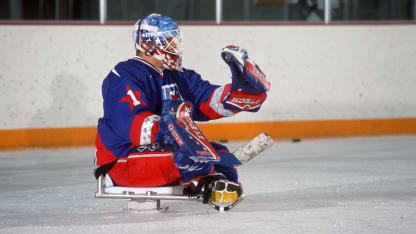
© USA Hockey
The United States was a considerable underdog heading into the Games after finishing sixth of seven teams at the 1998 Paralympics in Nagano, Japan, and arriving in Salt Lake City in 2002 with 10 rookies on its 15-man roster.
The U.S. went undefeated in Salt Lake City and outscored opponents 22-3 in its first five games to start a run of excellence in international sled hockey.
The U.S. national team is 26-2-0-6-1 (W-OTW-OTL-L-T) all-time and has won six medals, including five gold medals (2002, 2010, 2014, 2018, 2022) and one bronze medal (2006).
Rick Middleton, who coached the 2002 team, said perhaps that run doesn’t start without Guerra in goal.
“When a team has confidence in their goalie to save them when they’re in trouble, it can work the other way when all of a sudden you think you can win any game, and I think that’s what happened with us,” said Middleton, who played 14 NHL seasons for the New York Rangers and Boston Bruins from 1974-88.
“The first game was against Japan, we didn’t score three goals until the third period to win the game [3-0],” Middleton said. “So he saved the first two periods. … I think you look at the stats, we scored 22 and allowed only three. Those first three games, without Manny we wouldn’t have won them. Maybe not any of them.”
Guerra, 57, lives in Plymouth, Minnesota, after growing up in Chicago and living in Guadalajara, Mexico, for a time. He said he was always a good athlete, even after contracting polio as a child in 1967 that disabled his left leg.
“I just kind of limped around standing up,” he said. “I used to play all kinds of sports, boot hockey, baseball, basketball.”
After a back injury caused Guerra to fall into depression because it limited his activity, his then-wife implored him to do things to make his life a little easier.
“She went out and got a handicap placard for me, which I never had,” he said. “Even though I was against that, she got it, and I eventually gave in.”
He also gave in to the advice of the late Dr. Richard Owen, a polio survivor who was the medical director at Sister Kenny, and tried wheelchair basketball. It was Guerra’s first taste of adaptive sports, and an eye-opener.
“I realized that these guys were banging,” he said. “And what solidified it was when I went for a layup, one handed, I got raked across the arm. I realized it was my doctor with, like, these big Horace Grant goggles on. For me, it was, like, ‘Wow, this is valid. This is cool.'”
After seeing the sled hockey tape, Guerra joined a local sled hockey team that would receive used equipment and jerseys from the Minnesota North Stars.
“I remember putting on a Kari Takko jersey,” he said. “And the sticks, we didn’t have access to sticks that had an appropriate blade lie. They were regular standing-up sticks. We cut those. We adapted to it.”
Guerra received an invitation in 1992 to the U.S. national team trials. He competed in the 1998 Games in Nagano, which was the Paralympics hockey debut for the Americans.
That team finished sixth of seven teams, winning once in five games. When Middleton became coach ahead of the 2002 Games, winning a gold medal was the furthest thing on his mind.
“The program was in a shambles, we were going in as the host team and the last seed, sixth out of six into Salt Lake City, in front of our home fans,” he said. “I looked at it as a real pressure cooker.”
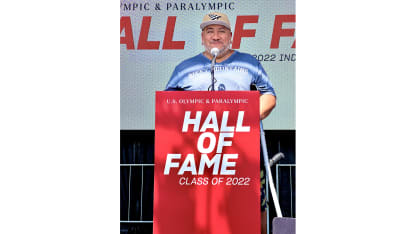
© Manny Guerra
He said Guerra helped alleviate the pressure on and off the ice.
“He was one of those veteran guys, you know, mostly joking around,” Middleton said. “Manny loved the limelight when it came to the press. It helped because a lot of the guys were pretty quiet. They had never been in that spotlight. Manny, he knew how to speak, and was very good at it.”
Guerra became the first Paralympic athlete to present a U.S. president with a team jacket when he gave it to President George W. Bush during a White House ceremony following the win in Salt Lake City.
He spoke for the team when it became the first Paralympic team inducted into the U.S. Olympic & Paralympic Hall of Fame in 2022.
Guerra is preparing to repeat that role at the U.S. Hockey Hall of Fame induction dinner and ceremony in Pittsburgh.
“I’m just so excited about this,” he said. “It’s super, super cool.”

